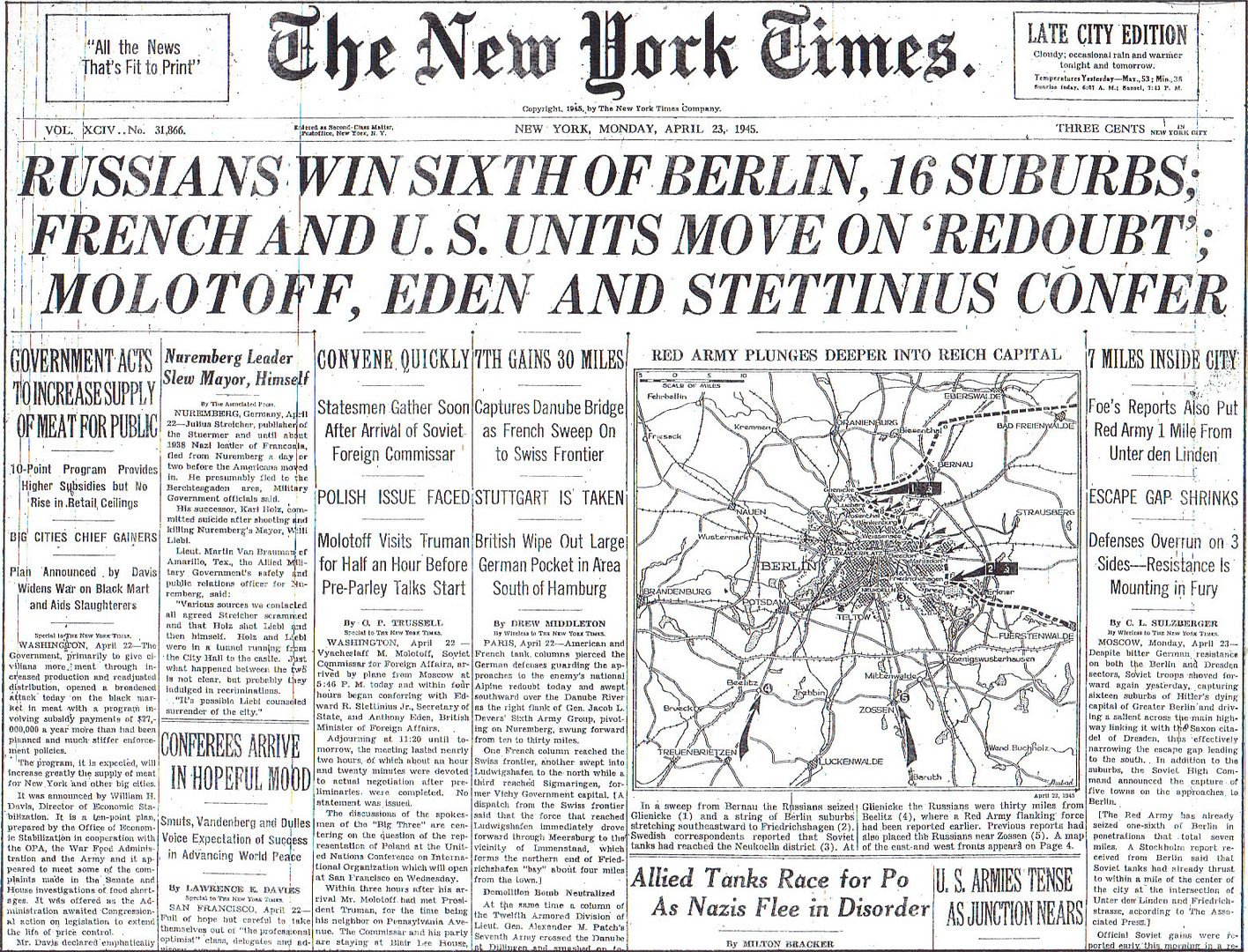
Posted on 04/23/2015 4:30:09 AM PDT by Homer_J_Simpson

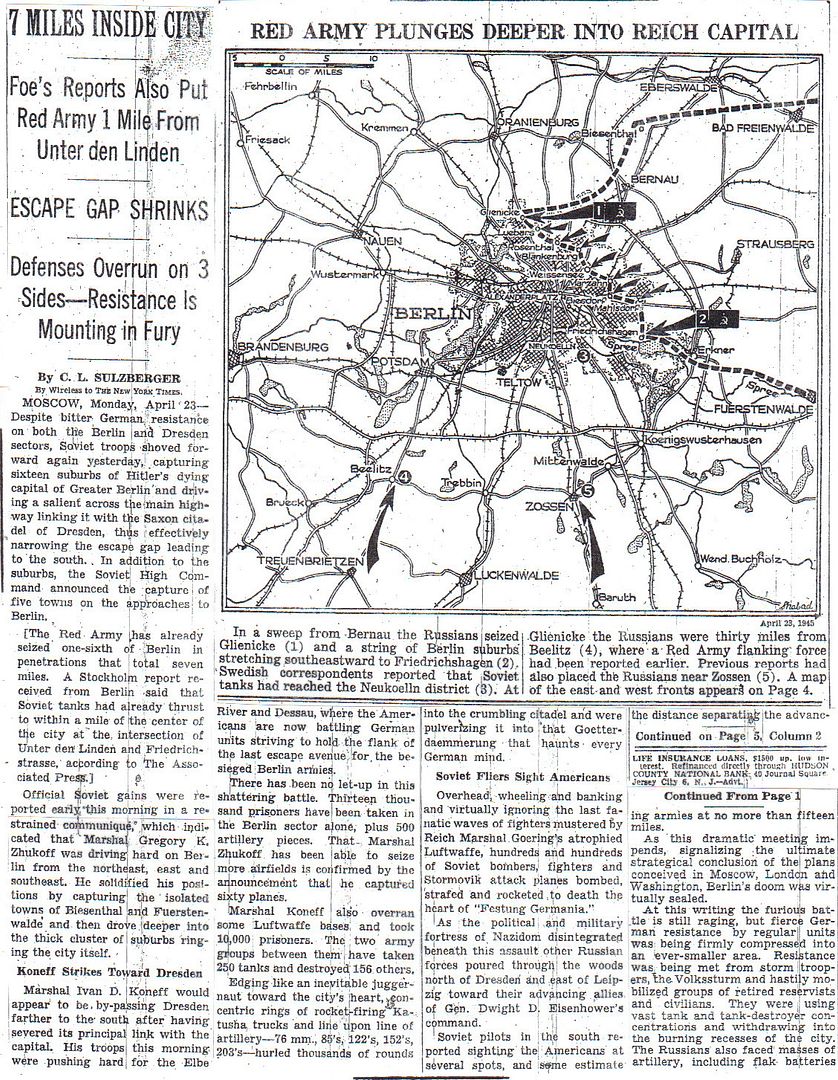
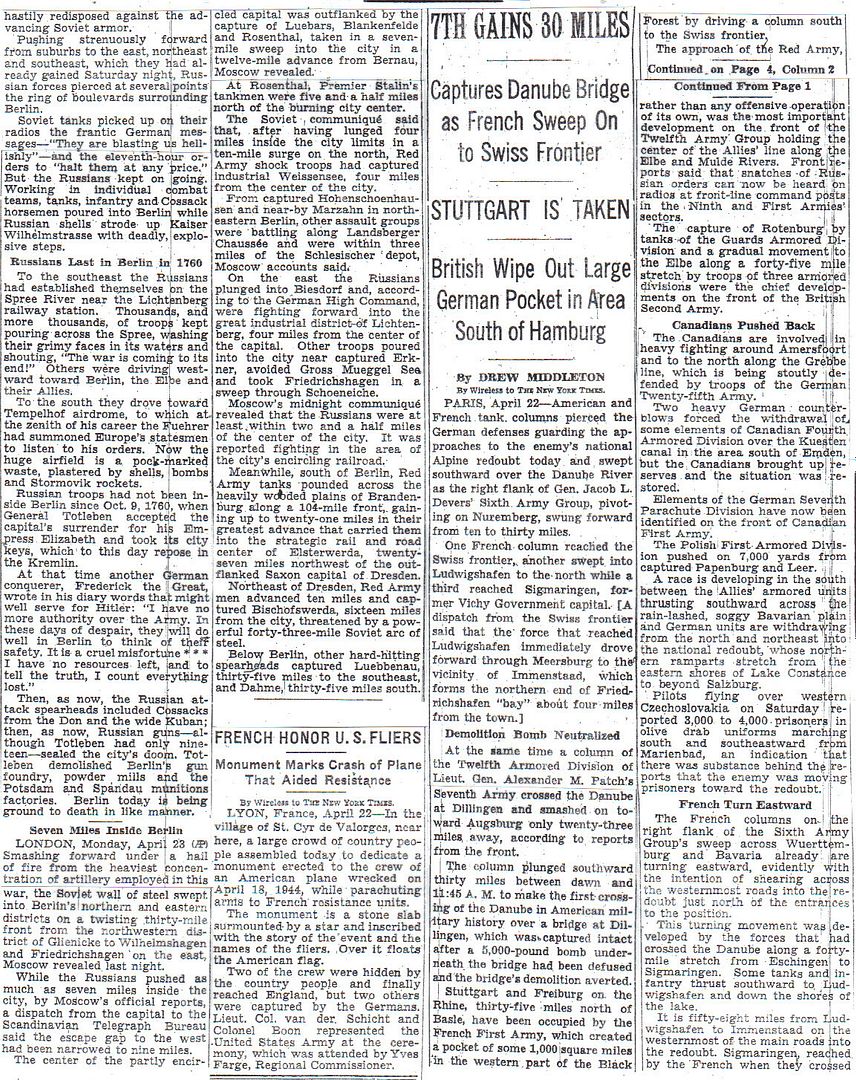
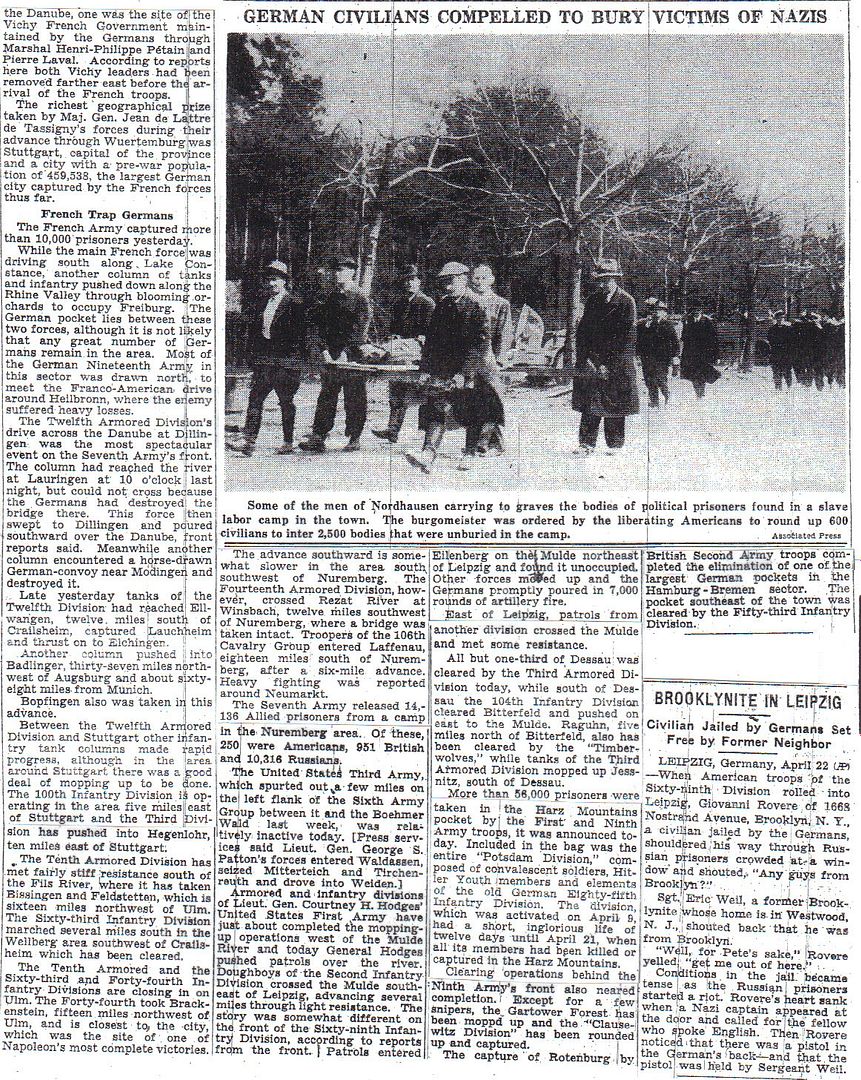
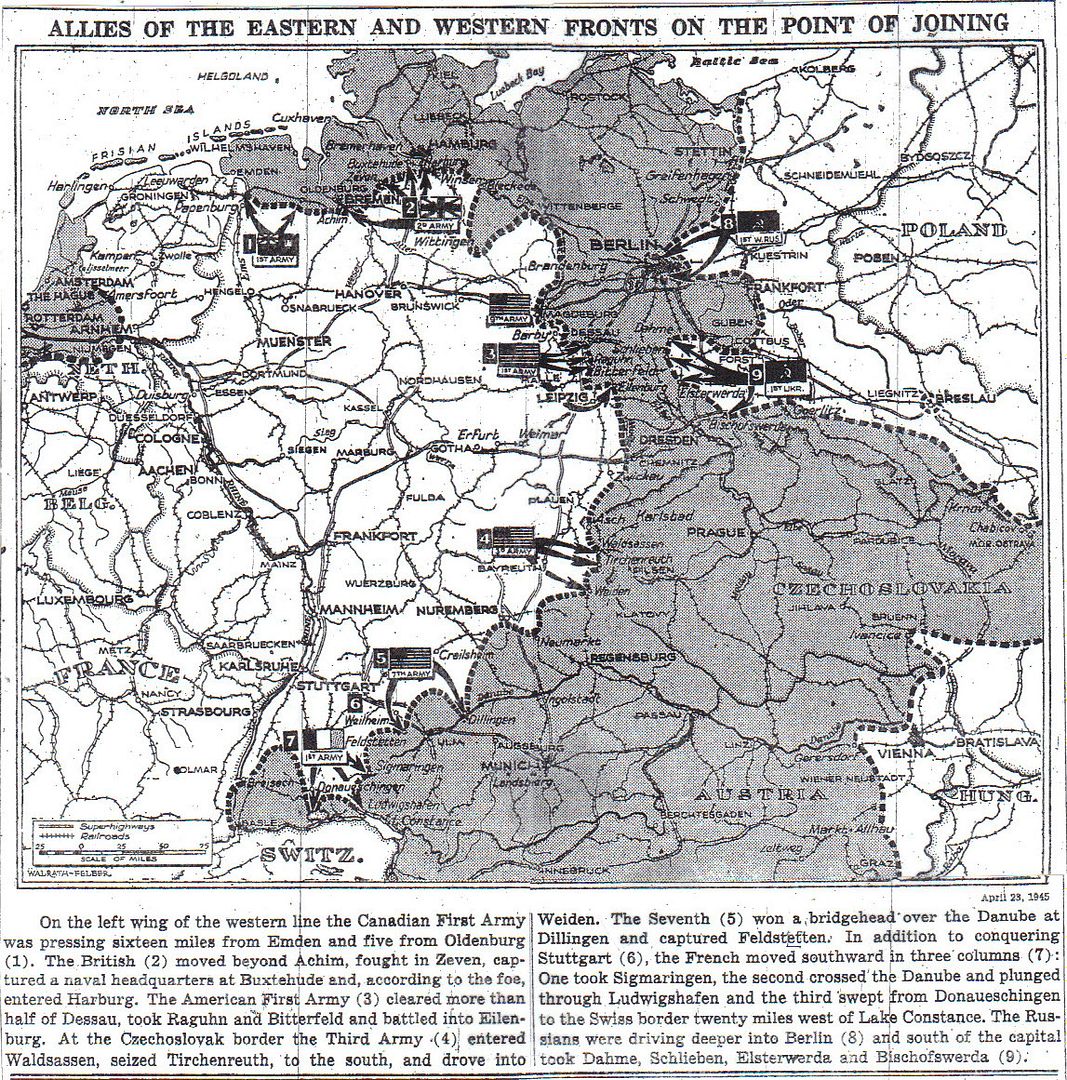
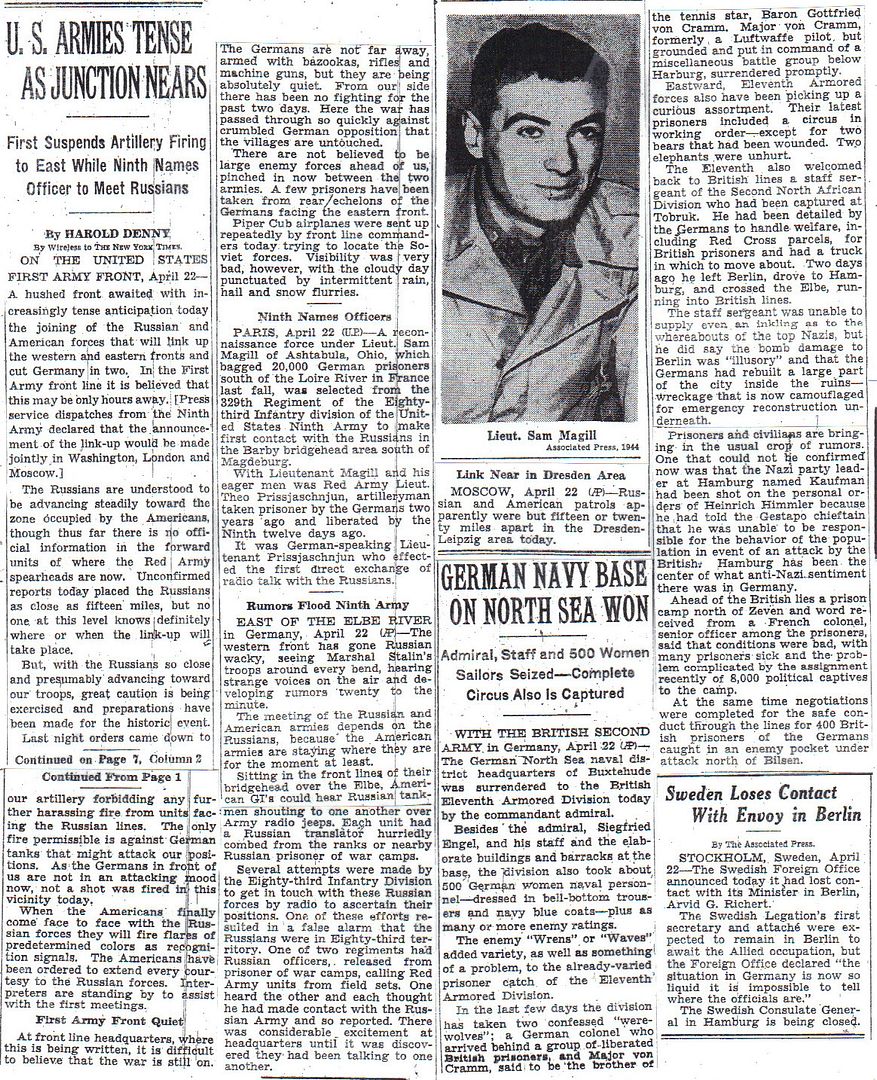
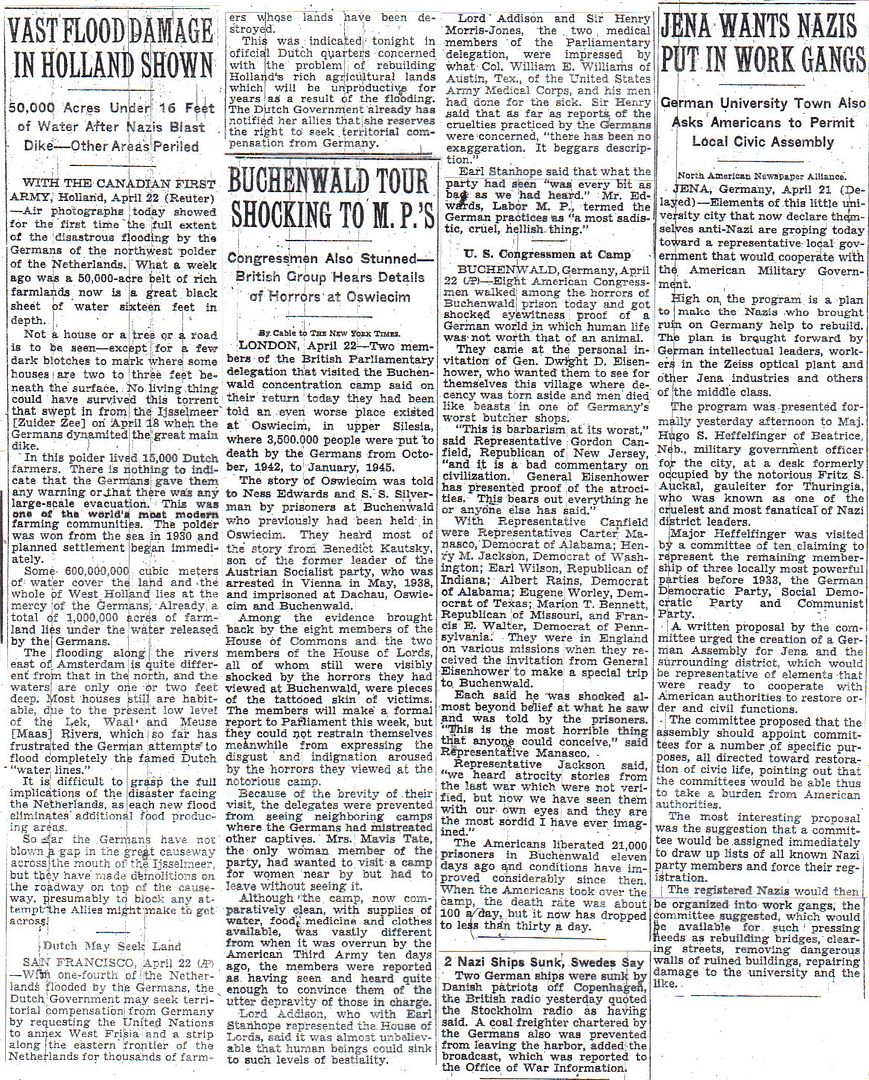
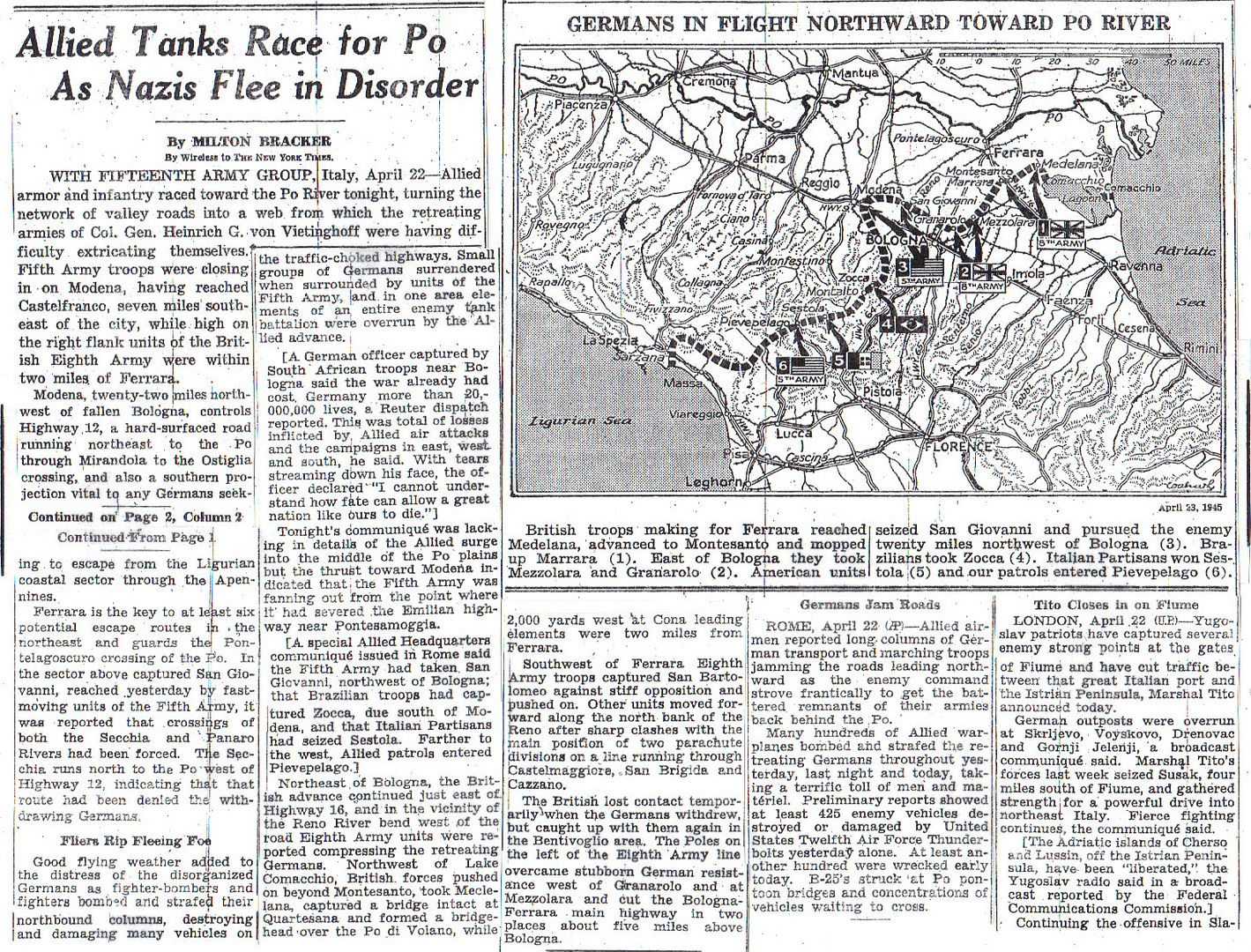
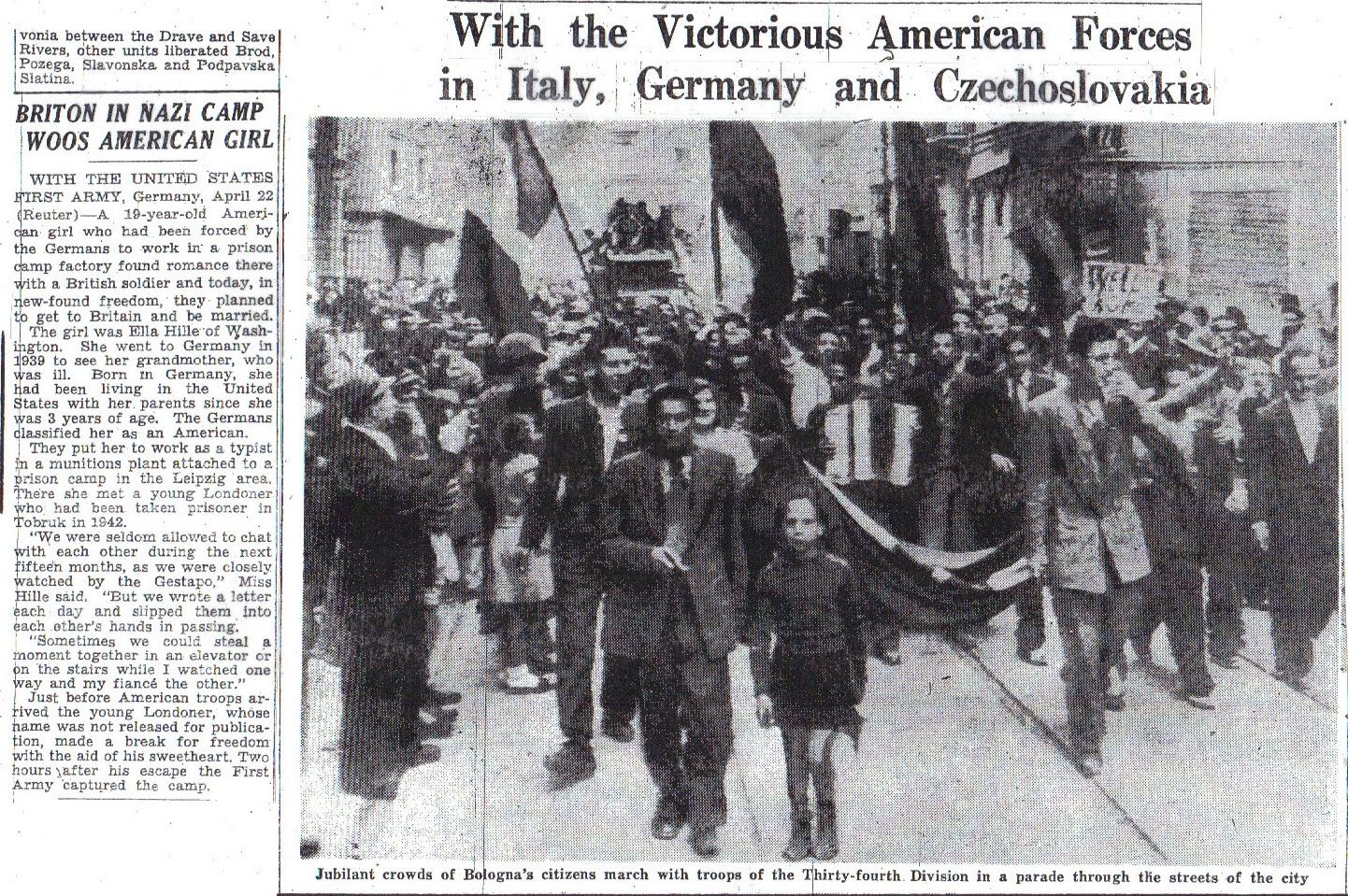


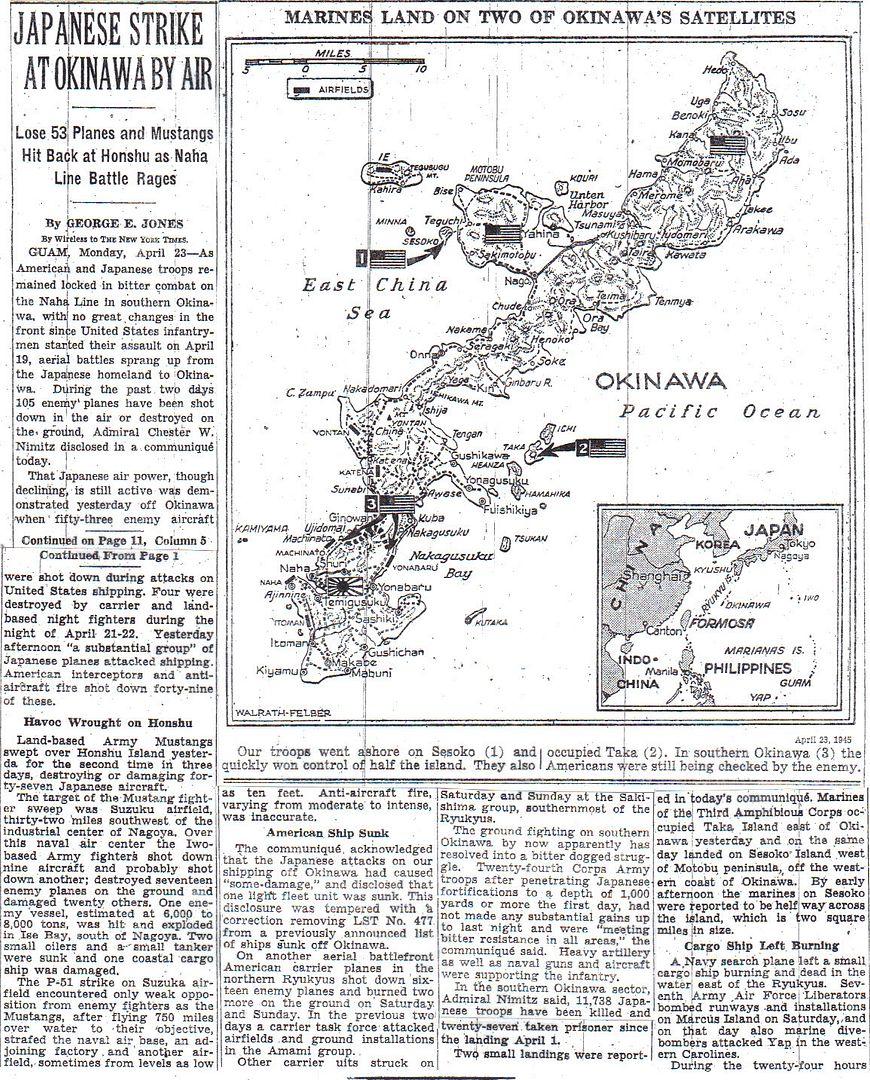
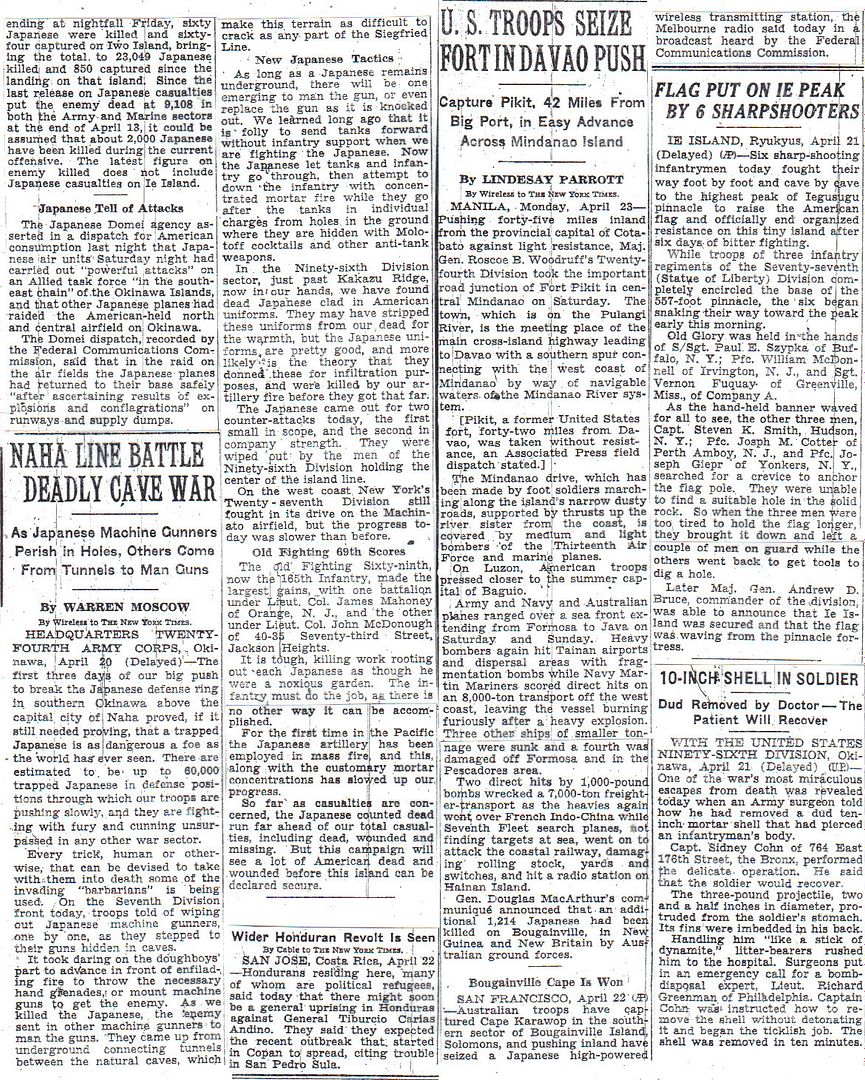
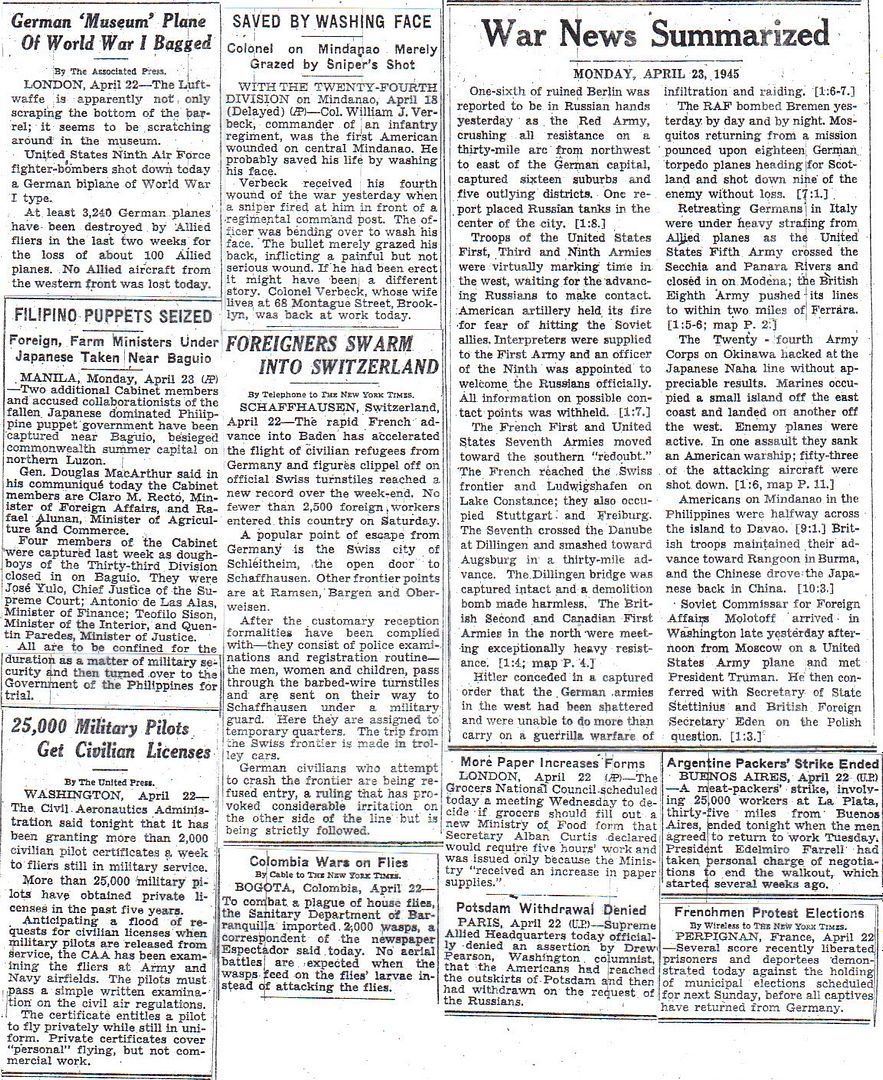
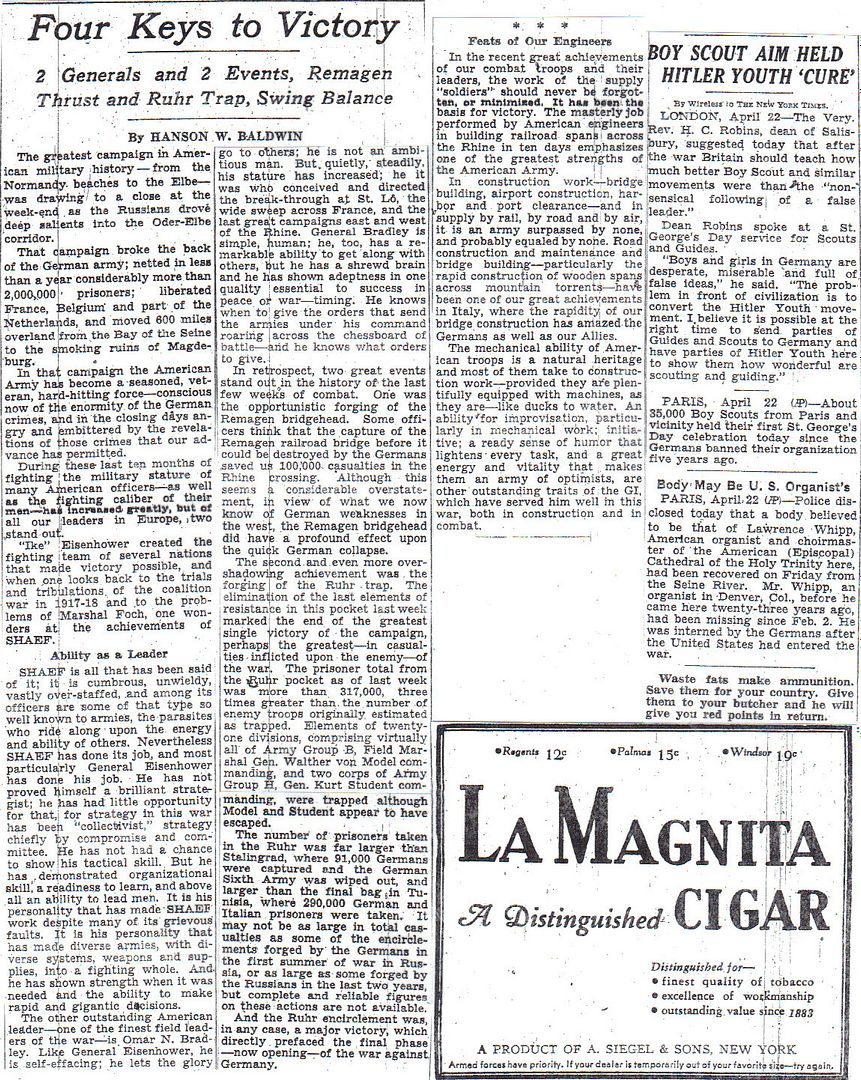
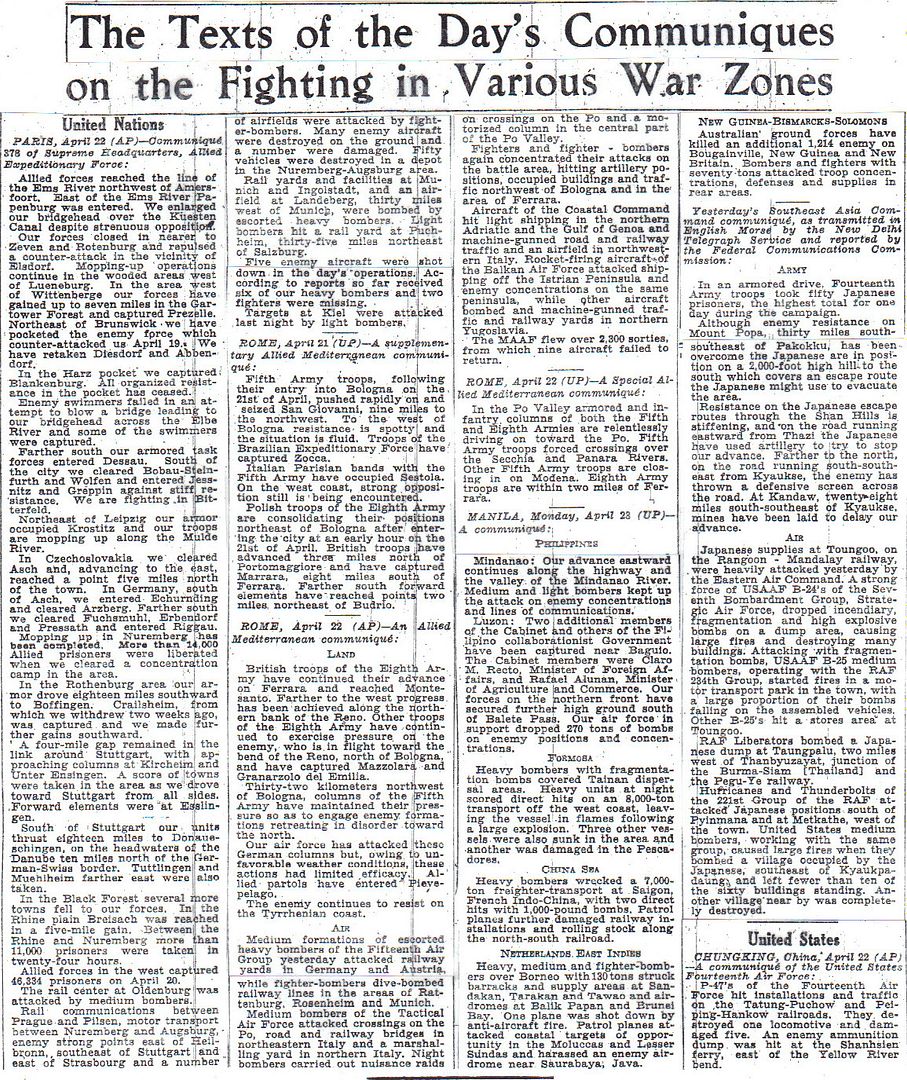
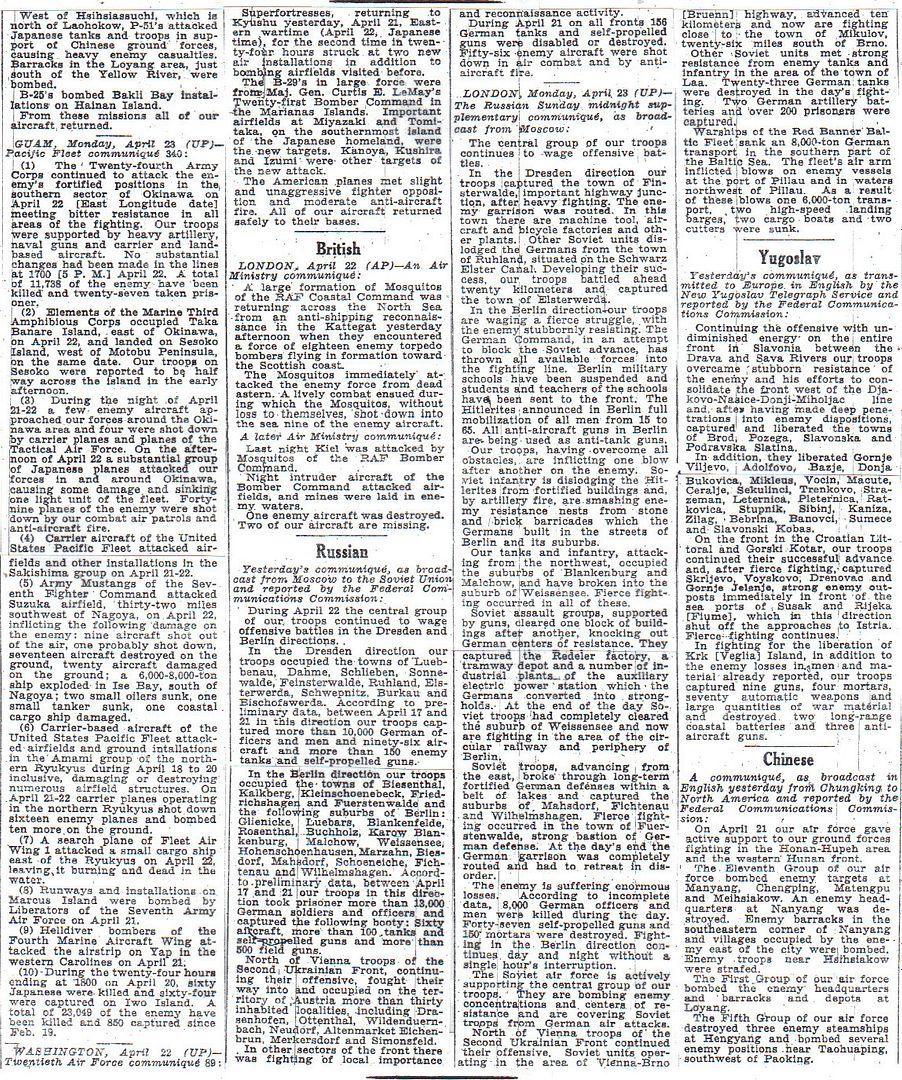
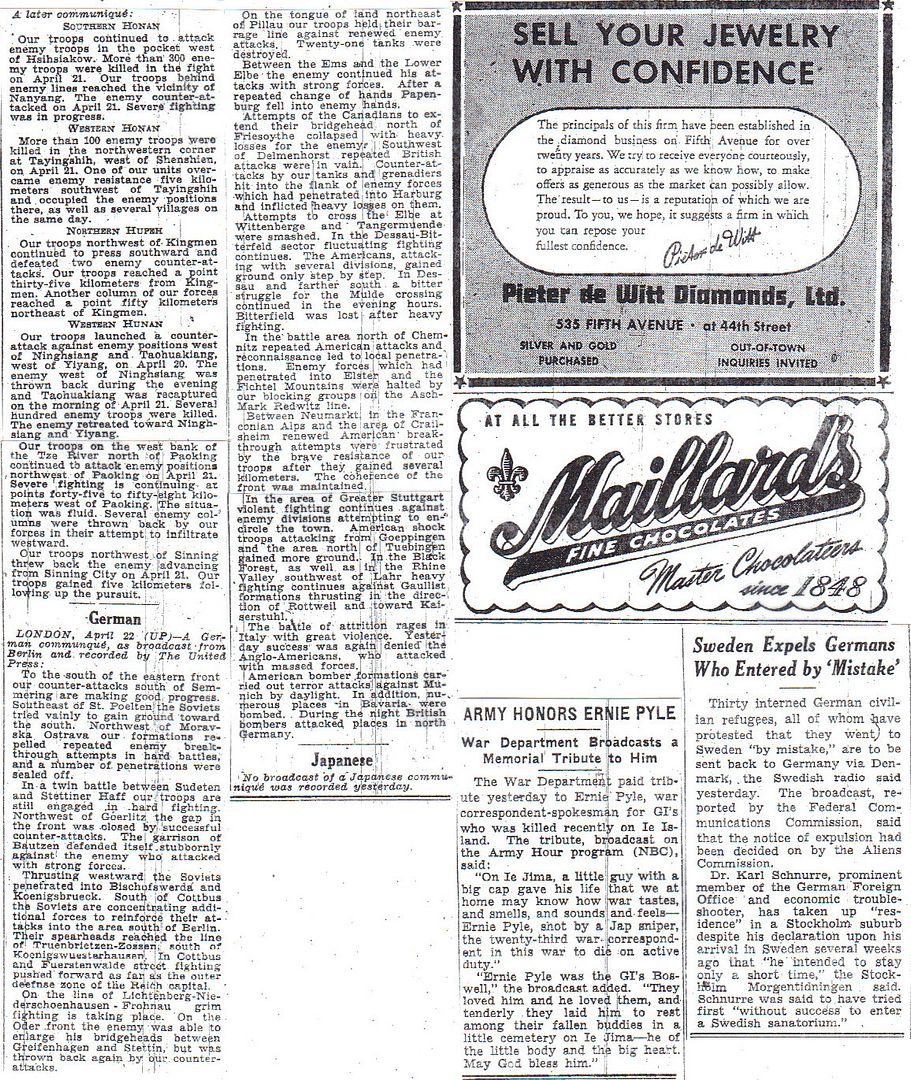
April 30th is when he kills himself. And not only is he not dead he just had Goering arrested for trying to take over.
Cute story on page 9 about the German-American girl and the British POW. I hope they lived happily ever after!
Trying again, some errant code got in there.
From above: “U.S.A.: At 12:15pm U-853, five miles southeast of Cape Elizabeth, Maine, torpedoes and sinks USS Eagle (PE-56). The Eagle was at a dead stop. The explosion amidships sends a geyser of steam and water 200 feet skyward, breaking the ship in two and sinking her within minutes. 49 seamen are killed.”
As per wiki: The loss was classified as a boiler explosion until 2001 when historical evidence convinced the US Navy to reclassify the sinking as a combat loss due to enemy action.
Sinking and Investigation
Eagle 56 was assigned to Naval Air Station Brunswick from 28 June 1944. At noon on 23 April 1945, Eagle 56 exploded amidships, and broke into two pieces 3 mi (4.8 km) off Cape Elizabeth, Maine. The destroyer Selfridge was operating near Eagle 56 and arrived 30 minutes after the explosion to rescue 13 survivors from the crew of 62. Selfridge obtained a sharp, well-defined sonar contact during the rescue and dropped nine Mark IX Mod 2 depth charges without obvious result. According to a classified Navy report, U-853 had been operating in the waters off Maine. At a Naval Board of Inquiry in Portland the following week, five of the 13 survivors claimed to have seen a submarine. Several spotted a red and yellow emblem on the submarine’s sail. These insignia match the markings of U-853: a red horse on a yellow shield. Eagle 56’s boiler was overhauled just two weeks before the sinking, and none of the boilers on the other 59 Eagle Boats had failed. Nevertheless, the official Navy inquiry concluded that Eagle 56 had suffered a boiler explosion.
On 5 May 1945, U-853 sank the collier Black Point off the coast of Point Judith, Rhode Island causing the loss of twelve lives. During the ensuing Battle of Point Judith U-853 was chased and sunk by Navy and Coast Guard ships.
This happened about 10 miles from where I am in Portland, Maine. This is the first I have ever heard of this.
- Dietrich Bonhoeffer
As people here are no doubt tired of hearing, yes, I have a degree in Germanic Languages and read a good deal of German literature and screenplays to get my degree.
I don't think it is generally known the extent to which the Germans accepted the responsibility for what they did in the name of the Nazi Regime. Starting in 1950 (when the average German was done picking up rubble and ready to get on with life) at least until 1981 when I graduated from college, German culture pretty much revolved around two themes. One theme was "How could we have let this happen?" The other was one of "Lost Honor."
The first theme is fairly self-explanatory, as the Germans sought to examine how an educated, advanced and developed country with a rich tradition of cultural and artistic accomplishment could descend into barbaric depravity. They have done an excruciating amount of soul-searching in this regard. In large part, we can thank the policy of “unconditional surrender” for forcing the Germans to confront their collective crimes. Since we had to crush German resistance by invading and conquering their country, then occupying it, we were in a position to not only uncover the scope of their crimes, but to rub their noses in it. Forcing German civilians to walk through the camps and bury the dead made sure they knew exactly what they had done. Putting the political and military leadership on trial made sure the world knew what they had done, and that punishment was meted out.
And for at least a generation, the Germans sought to divine the meaning of it all. Haushofer’s poem and Bonhöffer’s works are just the beginning. Men of intellect and conscience realized what they were dealing with much earlier than the average German, in whom time needed to work before they were ready to digest it. And as a young man interested in history, I read the German literature knowing exactly what they meant. It made for some very lively discussions auf Deutsch in Herr Piedmont’s and Herr Remak’s classes. Which was also an interesting difference; Herr Piedmont would have been a young Hitler Jugend in 1945, although he never talked about whether he held a Panzerfaust. Herr Remak was Jewish, having been “rescued” from Germany in 1937 by IU Chancellor Hermann Wells to come to Bloomington, Indiana, to teach German to midwestern rubes like me.
The two works I recall from the literature are they plays “Biedermann und die Brandstifter” and “Der Besuch der Alte Dame.” Biedermann und die Brandstifter, written in 1953 by Max Frisch, roughly translates as “Joe Six Pack and the Arsonists” It has been translated and performed in the United States under the title “The Firebugs.” In the play, there are a number of mysterious fires set in town, where Biedermann lives and has an upper room for rent. Biedermann is the typical middle class type, who today we would call the “Low Information Voter.” Two thugs show up to rent his room, and very soon it is apparent they are the ones setting fires. Through intimidation and Biedermann’s own willful blindness, the arsonists proceed in preparations to blow up and burn down the entire town. They tell Biedermann what they are going to do, and he is in denial, even as he proceeds to help them by cutting fuses. At the end, they in fact blow up and burn down the town. Biedermann finally confronts them and asks why they did this. Their response is “we told you what we were going to do, why didn’t you believe us?” And of course, not only did Biedermann say nothing, he actively participated.
The other screenplay, “Der Besuch der Alte Dame” or “The Visit of the Old Woman,” written in 1956 by Friedrich Dürrenmatt, is set in an impoverished town. It is visited by an old woman who had lived there as a young girl. She had been in love with one of the town’s residents, Alfred Ill, who jilted her. She left to become a prostitute, married a billionaire, inherited his wealth, and has now returned. She promises the town one billion (marks or dollars, the currency isn’t specified). All she asks in return is one thing; kill her former lover. The townspeople all cry out that such a thing is horrible and they are revolted by the thought. The woman says: “I’ll wait.” As she stays in town, waiting, Alfred notices that the residents are wearing new shoes and getting new clothes...on credit. One by one they start treating him...differently. In the end, the desire for money overcomes their sense of the Rule of Law and value of human life, and they kill Alfred for the money.
Both of those screenplays say so much about the nature of man. They illustrate how the Germans allowed a descent into the Nazi barbarity that, as in the sense of Biedermann, they were led to destroy Germany and all of Europe. And with the promises of a better future they were bought off to murder millions. For many years both of those screenplays have been on the night stand in my bedroom.
The other theme was “Lost Honor,” and this one is a little more complex. While the theme of “How could we let this happen” was obviously prominent, the theme of “Lost Honor” was more difficult for the Germans to express publicly. I put that theme as “Was all of our suffering and sacrifice only in the service of evil? Does that make us evil, too?” Every German family had someone or knew someone who had the epitaph “Im Osten Gefallen,” or “Fell in the East.” It was the simple statement of someone who had been sent to Russia, and was never heard from again. It was also the sentiment of those surviving veterans who had endured the hardships of combat, who fought and suffered with their comrades, many of whom they saw die. It played on a particular feature of the German Army; every regiment had a “home town.” The soldiers in a particular battalion all knew each other, as they had grown up together in the same neighborhood. So they saw their childhood friends die. If they survived for any length of time, as sergeants they were responsible for the lives of their friends’ younger brothers. And for their deaths.
An eloquent expression of this theme is the “farewell” speech of the German general to his soldiers in the last episode of “Band of Brothers.” It also appeared as the overriding theme in the memoirs of the German generals such as von Manstein’s “Lost Victories,” von Mellenthin’s “Panzer Battles” and von Luck’s “Panzer Commander.” The concept of “Lost Honor” was not so much a confrontation of what had happened, as an attempt to rationalize or sugar coat it for the sake of the veterans and their families. While it first appeared in the military memoirs, it wasn’t until later in the 1970s that it began to appear in general cultural terms in books such as Heinrich Böll’s novel “Die Verlorene Ehre von Katharina Blum” or “The Lost Honor of Katharine Blum.” In that book, Katharine Blum has an experience much like Biedermann, but now she is portrayed more sympathetically as a victim.
As I have said many times, the average German of my age in 1955, the guy who wrestled with the question of “How could we have let this happen?” was the same guy who, in 1928, would have said “That can’t happen here.” And that bothers me greatly, because I know the average American, the Low Information Voter, doesn’t give a damn that Bill Clinton sold our wealth to the Chinese, or care that Hillary Clinton kept her correspondence “off the books.” Or any numbe of other things that are eating away at the fabric our country and the destruction of our rights and the Rule of Law. Our Biedermanns say the same thing. “That can’t happen here.”
It is important to note that because we didn't militarily conquer the Japanese Home Islands the way we did Germany (we "occupied" Japan instead). The average Japanese didn't have to bury the stinking bodies of Filipino or Chinese children. We didn't have a public trial of their Emperor. Because of this, they didn't have the same stark confrontation as the Germans did. Also, it's not in the nature of the Japanese to do that sort of soul-searching. Instead, they came up with the cult of Godzilla.
I know I ramble a lot on these little essays, but the lessons I learned have a lot of meaning in my life, which I do not forget, and enable to me see, with sadness, what I perceive to be a repetition. Or maybe we are condemned to repeat history because human nature never changes.
Also avoided a repeat of that whole "Stabbed In the Back" meme that Hitler and co. so brilliantly exploited on their way to power.
Thank you for that better understanding of the German mind. I think that the WW I ending also played a part and also Hitler’s huge dislike of the Bolsheviks may have been widespread.
Thank you for that better understanding of the German mind. I think that the WW I ending also played a part and also Hitler’s huge dislike of the Bolsheviks may have been widespread.
Finally, our boys are coming down out of those damn Italian mountains.
Bttt while I sort out some children issues.
what I perceive to be a repetition. Or maybe we are condemned to repeat history because human nature never changes.
We are so condemned because it never does change, short of heaven. Often here on FR I read conservatives bemoaning the hell America and the world are becoming and vowing to turn it around. They can't and won't. They'll win skirmishes and battles, but eventual defeat is, in my view, inescapable. So, if that's where they put their ultimate hope, they are foolish.
A careful reading of Revelation, with the rest of Scripture, reveals that (a) the end times are, at most, a handful of decades away, and (b) man's inhumanity to man, especially toward God's people, will accelerate during them. In that context, then, I suggest we may rightly view the atrocities of WW2 and those since as the prelude, as Act 1 if you will.
But that is not cause for gloom; rather, we may rejoice that the time for such holocausts is soon to end, finally. They must happen before the new millennium of peace nears, after which the final battles will lead directly to eternal peace for those who trust not conservatism but Redeemer.
No, the Nazi’s never got to Goering.
I agree, it was a very informative essay. Henkster’s observation of the different experiences of Germany and Japan was insightful.
Regarding whether the End is Near, one has to note that Christians have always believed it is, regardless of the calendar year. Regarding whether the American experiment is near its end - Conclusion: It was the best thing going for quite a while. - all states to date have ultimately given way to entropy.
“Build the America you want on your street, and keep looking up,” as Sarah Palin said. For now, things are good one my street ... even if they go downhill as soon as you get to the Walmart, where the $2.97 wine is now $3.17.
You're absolutely correct, of course. But Christians have always before engaged in mere wishful thinking about it, without the substantial evidence we now have for its actual imminence. For example, Jesus instructed us to take the Gospel to the entire world before the end could come, but the practical means for doing that have never existed, meaning that any expectation of the end times was therefore nonsensical.
However, recently these significant phenomena have occurred, for the first time:
* the reestablishment of Israel after two millennia, as predicted by Moses
* the appearance of the escalating signs of the end, as predicted by Jesus
* the technology, finally, as predicted by Daniel and Jesus, to take the Gospel to the entire world, via safe worldwide transport, television/radio, and internet.
At some point the wishful thinking must transform into reasoned expectation, and events strongly suggest that the time has come at last. I do not expect my grandchildren to have their own grandchildren.
I think this one can be found at any time, sometimes even more so than today.
* the technology, finally, as predicted by Daniel and Jesus, to take the Gospel to the entire world, via safe worldwide transport, television/radio, and internet.
Our true global reach is a novelty, but people in the past didn't realize how much of the world they were unaware of.
the reestablishment of Israel after two millennia, as predicted by Moses
That's new.
I'm not saying you couldn't be right in your expectations today, just emphasizing that people in the past did have reasonable expectations of Christ's return, given the information available to them.
You are welcome. And when I read your comment, I was reminded of the excerpt from "Band of Brothers" posted by Homer a week or two ago. The GIs from the 101st talked about their impressions of the different peoples of Europe. They came to the conclusion that they liked the Germans the best, because they seemed so much like us. Hard working, thrifty, industrious.... And they gassed millions and stuffed their bodies in ovens.
So much like us...the German mind is the American mind.
That can't happen here.
I think I read that about 1/3 of American soldiers at the time were of German heritage, and that’s not counting the ones who would call themselves “Anglo-Saxon.”
42 “Therefore keep watch, because you do not know on what day your Lord will come. 43 But understand this: If the owner of the house had known at what time of night the thief was coming, he would have kept watch and would not have let his house be broken into. 44 So you also must be ready, because the Son of Man will come at an hour when you do not expect him."
I shouldn’t have had to but I did have to look it up. That “Oswiecim” that was reported to be worse than Buchenwald was, of course, Auschwitz. The liberators were men who, much better than we, knew what the Nazis were, and they couldn’t believe it.
I’m the one eating and drinking, none of that “grinding with the handmill” stuff.
Even during my natural-foods phase (which I may resume when I have more spare time) I used an electric grain mill.
Disclaimer: Opinions posted on Free Republic are those of the individual posters and do not necessarily represent the opinion of Free Republic or its management. All materials posted herein are protected by copyright law and the exemption for fair use of copyrighted works.